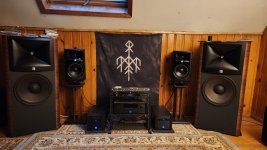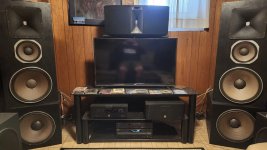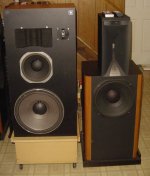As the listening distance grows, so does the sweetspot.
I am well aware of that it's a angle after all. I own an older system with similar and also have wide CD types and prefer the wide CD. In my experience the wide CD offers more room friendly set-up and a larger and more stable sweet spot.
Just my personal take on things.
Rob 🙂
Last edited:
at 1m, ±12° is 0.42m (16.5"); at 2m, 0.84m (33") who has a head that would fit in a vice that is 16" wide 😂
LOL I get you but that's an old expression. Also the stand up sit down where you hit the nulls and if poorly placed they can give you real issues slightly off axis.
Like I said a personal preference.
Rob 🙂
Attachments
Last edited:
It varies of course, but I agree with you here. Beamy speakers ask for more commitment to dial them in properly.Also the stand up sit down where you hit the nulls and if poorly placed they can give you real issues slightly off axis.
Unless both of the two horn systems of NicoB’s customer’s are in rooms much different (especially bigger??) than mine, NicoB seems to make a good case for constant directivity horns, and for them remaining constant with frequency up to ~ 7 to 8kHz.Wider dispersion increases the coverage area, but won't improve imaging, hence my reluctance to recommend any constant directivity horn over your beamy (but very smooth) AH425s, considering you are the primary listener.
It’s a shame that the sentence structures here are so badly fragmented, but it seems all adequately intelligible and tightly cross referenced enough for where if my room if not a whole lot different than one of them should not one or his two horns warrant more serious consideration?
https://audiohorn.net/constant-directivity/
https://audiohorn.net/sciences/critical-distance/
https://audiohorn.net/constant-directivity/
Last edited:
I am well aware of that it's a angle after all. I own an older system with similar and also have wide CD types and prefer the wide CD. In my experience the wide CD offers more room friendly set-up and a larger and more stable sweet spot.
Just my personal take on things.
Rob 🙂
Hello All,
The ratio of direct sound to reflected sound is a thing. I prefer ~ 60% direct sound to ~ 40% bouncing off the walls sound. A deep room (front to back distance) requires a narrower angle of coverage.
On my bench top, where I am sitting pretty much direct / near field, I am using JBL 90 X 90 CD PT waveguides with JBL2408H-2 drivers. Much more up close and personal without the in your head headphone effect.
Thanks DT
@oltos , give please give the top 5 most concerns you have at this time...
Auditioning those three speaker systems.
Getting a pair of JBL2450J restored and Be diaphragms installed by end of April.
Hoping patience among of those here whose experience and knowledge I depend on for guidance doesn't expire-despite my knowledge gaps, occasional memory lapses or perhaps when asking questions which may revisit topics which the panel of experts had deemed closed, at least until Weltersys reviews my room sketch.
That I know the exact horn and driver I want to use by end of April. And that if I choose Troy's ES290 horn that Athos is willing and able to perfectly clone it-including the anti-resonant bump that Troy later added inside the mouth, and the grooves on the top side for mounting a tweeter, in case I need to add one. Must confirm with Troy that file has those updates. https://josephcrowe.com/products/3d-cad-plans-for-es-290-biradial-horn-horn-no-1670 Also, confirm with Athos that he can have the horns cut, sanded, stained and shipped conveniently for Troy.
As per Weltersys's request, that I finish a sketch which adequately displays my room as described here. https://www.diyaudio.com/community/threads/best-compression-drivers-today-2022.382609/post-7965136
Presumably, evaluating that sketch will best assist Weltersys and others for determining optimal horn selection.
Last edited:
This reminds me of a friend I have. I was getting ready to go to a party and asked if he'd like to come. He asked a barrage of questions: "Where is it? How late are we staying? Hows the parking? What kind of food? Who's gonna be there?" Although this was a bit excessive in my opinion, but I answered as best I could. Then he asked his last question,
"Will I have fun?" At which point I fell on the floor laughing.
"Will I have fun?" At which point I fell on the floor laughing.
Last edited:
Umm so hes not going to build it for you? I definitely missed that in the discussion.if I choose Troy's ES290 horn that Athos is willing and able to perfectly clone it-including the anti-resonant bump that Troy later added inside the mouth
A recording's clarity and accuracy are independent from the speakers ability to reproduce them.So my question is would I not be better off with a less beamy horn than the AH425; one which can project an expansive sweetspot but not so big that it compromises the recording's clarity and accuracy of vocal and instrument imaging?
If you mean accuracy in "imaging" as the ability for a speaker to reproduce a precise sense of the width, depth and height of the recorded "sound stage", a speaker with a smooth reduction in horizontal or vertical beamwidth may have an advantage or disadvantage in that attribute depending on it's deployment in a given room.
You may, or may not prefer a less beamy horn to one with wider dispersion in your room.
You would be better off comparing horns than guessing which you might be "better off" with.
Earl Geddes has polar plots of his speakers represented in several different formats.Speaking of which, as Lynn's thread is like the genesis of the 425 has anyone ever seen a Geddes plots of that horn there? In fact, I can't recall seeing any such plots on any thread on this forum.
AND what about the Geddes plots of all those other JMLC-like horns you said you've heard?
I'm not going to guess which format you are asking about.
I didn't create polar plots for the beamy horns I've heard over the last 50 years, and I have not found plots of the ones I heard that have polar response similar to Jean-Michel Cléac'h horns.Let's see some.
A proper sketch may assist you in selecting horns that cover the room in the way you might find most preferable.Presumably, evaluating that sketch will best assist Weltersys and others for determining optimal horn selection.
From the all the questions you have asked, and the subjective preferences you have stated in the hundreds of posts I've answered, I still can't say that any horn/driver combination you may choose over the excellent pair you own would better suit your preferences.
For sound reinforcement work or studio monitoring my preference is constant directivity (generally a nominal 90Hx45V as "one size fits all" choice), but for the crap acoustics of the compromised listening position chosen in my "home theater", my preference is a beaming loudspeaker system.
Art
That I can't say yet. I do expect there would be a substantial price difference, though I haven't discussed this with Troy, Will contact Athos about doing this very soon.Umm so hes not going to build it for you? I definitely missed that in the discussion.
Would you mind describing the size and general acoustical environment of your room?I am well aware of that it's a angle after all. I own an older system with similar and also have wide CD types and prefer the wide CD. In my experience the wide CD offers more room friendly set-up and a larger and more stable sweet spot.
Are the speakers far from rear and side walls? Your listening distance?
Do your CD horns resemble these?
https://audiohorn.net/x-shape-horn/
https://audiohorn.net/next-gen-bi-radial-horn/
https://www.usspeaker.com/homepage.htm
With a relatively large sweet spot from your CD horns does imaging suffer, or do you usually strike a good compromise by varying your listening distance, based on what aspects of the recording?
With a relatively large sweet spot from your CD horns does imaging suffer, or do you usually strike a good compromise by varying your listening distance, based on what aspects of the recording?
I have 2 systems that are using 100 X 100 and 120 X100. My third uses 80 X 80. In all toe in and distance are key. My best imaging are the 80 X 80 and the 120 X 100. The 100 X 100 is no slouch but takes a back seat because of size and distance between drivers. As with any system once you dial them in your are good to go,
Not sure what you mean by what aspects? Either they image well or they don't.
The 4344 compared to the Array Clone 80 X 80 using the same Be load as the 9800 is exemplary. The 4344 is old school and as much a I like it pales in comparison. The passive M2 120 X100 is right up there with the Array and has even better image stability. My active 4 way using PTH 1010 100X100 is the "DOG" but my reference point and would surprise anyone going on looks alone.
I have a preference for CD horns, you may not hence the importance of taking some time to hear systems in real rooms so you can determine for yourself what you like. In my rooms they seem to work best.
YMMV Rob 🙂
Attachments
Last edited:
Any Geddes plots of those speakers?I have 2 systems that are using 100 X 100 and 120 X100. My third uses 80 X 80. In all toe in and distance are key. My best imaging are the 80 X 80 and the 120 X 100. The 100 X 100 is no slouch but takes a back seat because of size and distance between drivers. As with any system once you dial them in your are good to go,
Of course, I'm no DIYer, so if I were going to pursue CD speakers if would have to be with one of those CD horns linked above, with appropriate drivers and crossed with my midwoofers and cabinets. I'm hoping Troy Crowe would agree to this if those horns I hear next month sound great in rooms not too different than mine.
A long shot, of course. That's why if those listening sessions with NicoB's CD horns don't work out or somehow prove inconclusive, at least there's Troy Crowe's exponential horns. True, they narrow above ~ 7kHz in the -6db range. https://cdn.shopify.com/s/files/1/0...BMS_4591-8_off-axis3_480x480.png?v=1649504045
But how likely would they have as much of a head in vise sweet spot, like the AH425 horns might?
Last edited:
Any Geddes plots of those speakers?
Nope look up the Array 1400 Stereophile and the M2 on Erin's site. 4344 long before spinorama. Active DIY on axis only. Array 880 on ASR.
Rob 🙂
Psycho-acousticians use a measure called the coherence to determine when a signal will sound spacious. In this case, coherence is simply the normalized cross-correlation between the left and right ears. It varies between 0 and 1 with 1 indicating completely correlated signals and 0 being completely uncorrelated. The lower the coherence the more spacious the sound is.
When signals arrive from any direction that is in the plane of symmetry of the head, then the coherence of those signals must be 1 since they have to be identical or nearly so. This means that any reflections that arrive in that plane cannot add to spaciousness - they only tend to confuse imaging. So your example only works if the front wall has diffusors. It might enhance spaciousness, but again will degrade imaging. I use absorption to eliminate any frontal reflections thus enhancing imaging. This then also increases the ratio of lateral later reflections from the rear of the room adding spaciousness without sacrificing imaging. Signals arriving from the front (except the first arrival) can only degrade the image.
Could you please describe what they (or you) mean by "spacious" (without circular definition)? Appreciated.
Would you please elaborate on this. What exactly create problems in this context?It may be counterintuitive, have you considered that both of these things have been shown to create problems?
It is all explained in this thread.
https://www.diyaudio.com/community/threads/is-it-best-to-use-a-non-axisymmetric-waveguide.375799/
https://www.diyaudio.com/community/threads/is-it-best-to-use-a-non-axisymmetric-waveguide.375799/
I'm late to the party but this topic is interesting.
Is there an alternative to the B&C horn when we are talking about the initial topic - large CD horn you can buy? Large means able to support a 2"/1" Coax driver from 4-500Hz on. https://www.bcspeakers.com/en/products/horn/1.4/0/ME464
A lot of the later discussed horns are not CD and less interesting for my use.
Is there an alternative to the B&C horn when we are talking about the initial topic - large CD horn you can buy? Large means able to support a 2"/1" Coax driver from 4-500Hz on. https://www.bcspeakers.com/en/products/horn/1.4/0/ME464
A lot of the later discussed horns are not CD and less interesting for my use.
- Home
- Loudspeakers
- Multi-Way
- 1.4" or 2" throat large constant directivity horns you can actually buy!



